“People do not give it credence that a 14-year-old girl could leave home and go off in the wintertime to avenge her father’s blood but it did not seem so strange then, although I will say it did not happen every day. I was just 14 years of age when a coward going by the name of Tom Chaney shot my father down in Fort Smith, Arkansas, and robbed him of his life and his horse and $150 in cash money plus two California gold pieces that he carried in his trouser band.” — Charles Portis, True Grit
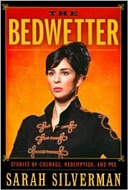 |
The Bedwetter, by Sarah Silverman I haven’t watched Sarah Silverman’s TV show, The Sarah Silverman Program, so the insider-ish chapter of her memoir that dealt with the show was of only minimal interest to me … I’m unfamiliar with the writers and actors she talks about in that section. But I’m broadly familiar with her career, and so the rest of the book was interesting. She’s a good writer (no ghostwriter here!), she knows her own mind, and she’s brutally honest throughout. |
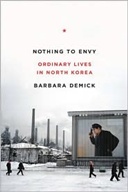 |
Nothing to Envy: Ordinary Lives in North Korea, by Barbara Demick I’m fascinated by North Korea. Although I’ve read a number of books about the country, its politics, and its leaders, I’ve never been able to get a sense of what it must be like to live there. Until now. Barbara Demick relays the stories of six everyday North Koreans from the northern city of Chongjin, following their lives from the end of the relatively boom times of the 1960s and 70s into the economic decline of the 1980s and the famine years of the 1990s, and finally through their individual decisions to risk all by escaping and resettling in South Korea. Most NK studies focus on the father/son regime of Kim Il Sung and Kim Jong Il. Deming focuses on the reality of daily life in a country that has no jobs, money, clothing, food, fuel, heat, or electricity, yet manages somehow to fund a police state that spies and reports on every citizen, at all levels of society, 24 hours a day, 365 days a year, eclipsing even Orwell’s Big Brother. Nothing to Envy is a story of survival, nothing less, and is a gripping, white-knuckle read. Of all the books I’ve read on North Korea, this is by far the most interesting and educational one. |
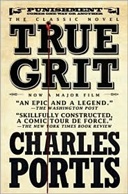 |
True Grit, by Charles Portis I’ve read only one other Charles Portis novel, Norwood, which I loved. Now that I’ve also read True Grit I’ll start grabbing everything by Portis that’s still in print. The man is a genius at creating eccentric characters who tell their stories in unselfconscious, straightforward ways. And what interesting stories. I never would have guessed the nature of Charles Portis’ novel from watching the 1969 John Wayne movie adaptation. I hear the Coen brothers’ 2010 adaptation is closer in spirit to the book, and will now rush out to see if it is true. But whichever movie you like, you owe it to yourself to read the novel in its original form. I have to share the following passage, where Mattie asks a sheriff in Fort Smith, Arkansas, to recommend a lawman to help her find the man who shot and killed her father:
I’m telling you, from that point on I could not put this book down! The language of Mattie Ross, but even more so her incredibly brave character, will stay with you forever, and you’ll understand why a literary cult has formed around the name Charles Portis. |
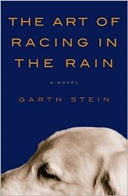 |
The Art of Racing in the Rain, by Garth Stein When I read The Story of Edgar Sawtell, parts of which are told from the point of view of a dog, I believed in the dog. Not so Enzo, a dog who is practically human, a dog who, in fact, wants to be reincarnated as a human. And I thought, for the first two or three chapters, “I’m not buying the premise here.” But I kept reading, and I got pulled in, and I began to believe in Enzo, the narrator of this bittersweet story about a Seattle dad who loses his wife to cancer and whose career as a professional race car driver is nearly derailed … and his daughter nearly taken from him … by some horribly manipulative in-laws. When Enzo reached the end of his life, in the arms of his master Denny, I cried like I haven’t cried since they shot Old Yeller. Damn, this is a sweet, sweet book. |
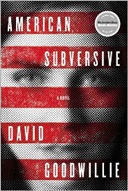 |
American Subversive, by David Goodwillie A decent novel about American radicals, the kind who set off bombs, descendants of the Weather Underground and the Earth Liberation Front. Events in this novel, unlike those in Stuart Archer Cohen’s excellent and exciting The Army of the Republic (you can read my review here), are described passively: what action there is is described at one or two removes, through the after-the-fact words of one radical and one blogger who get swept up in a plot to blow up an office at a major media headquarters in New York City. There are also too many coincidences and fortuitous strokes of luck for my taste (not to mention plausibility). If you’re interested in this sort of story, you’re far better off with Cohen, but even so, this one is an interesting read. |
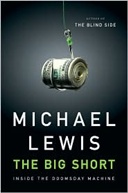 |
The Big Short: Inside the Doomsday Machine, by Michael Lewis I knew nothing about the arcane financial devices savvy traders were betting on and against in the lead-up to the sub-prime mortgage crisis of 2008 and the resulting global economic meltdown, which depleted our 401Ks and enriched Wall Street CEOs and bond traders at the expense of everyone else. Now I know a lot more. Not enough to understand exactly how the greedoids made fortunes trading worthless packages of sub-prime mortgages, but enough to understand that all they gave a shit about was lining their own pockets. I learned that the CEOs of investment banks and huge firms like AIG, Bear Stearns, and Lehman Brothers didn’t know what the hell they were doing, and that ratings companies like Standard & Poor’s and Moody’s deliberately and knowingly rated packages of worthless subprime mortgages as AAA, keeping many in the financial industry in the dark as to the looming crisis. And now I understand why the French loaded their aristocracy onto tumbrils and hauled them to the guillotine. Our financial aristocrats fucked us over. They walked off with our money, not caring in the slightest whether we lived or died afterward, and to this day they’re proud of themselves. Lay in a good supply of soap and a stiff brush before reading: you’ll want to scrub yourself thoroughly afterward. |
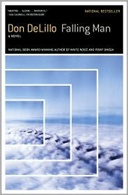 |
Falling Man, by Don DeLillo I struggled to get through this novel. The gist comes through pretty early: people who survive the 9/11 terror attacks on the World Trade Center in NYC walk through the next few weeks and months as if they had in fact died in the attack and are now ghosts, going on sheer momentum. As months turn into years, they slowly come back to their lives, but are altered forever. Got it. Stretch this message out with page after page of listless, desultory dialog that seems fraught with meaning but could equally be meaningless; throw in a few glimpses of one of the terrorists; top it all off with a grisly, detailed description of what it might have been like to be high up in one of the towers immediately after the jetliner crashed into it; there’s your formula. Falling Man is good, but would have been brilliant as a short story. Padded out as it is to novel length, it rather left me flat. |
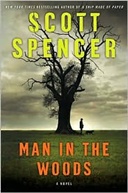 |
Man in the Woods, by Scott Spencer A novel about faith. A secular man (who lives with a religious woman) unintentionally kills a man and gradually comes to terms with his actions, gaining a level of religious faith along the way. Curiously, his companion and lover, a popular religious writer and radio commentator, finds her faith disappearing. At the center of the novel is the dog that formerly belonged to the slain man, and there is even a line somewhere in the middle of the story where the author points out that “dog” is “god” backwards. Scott Spencer overcomes the triteness of that observation by writing a gripping, suspenseful, character-driven novel that stands with Jonathan Franzen’s Freedom (you can read my review here). Man in the Woods is a terrific read. |
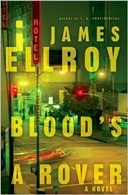 |
Blood’s a Rover, by James Ellroy I remember being impressed with Ellroy’s The Black Dahlia and L.A. Confidential, less impressed with Killer on the Road and a couple of other novels. I am sort of impressed with this one, Blood’s a Rover, but not impressed enough to plow all the way through it, plow being the operative word. The story should be irresistable: a brutal and successful armored car holdup, the selling of Las Vegas to Howard Hugues, the employment of dirty tricks in the Nixon/Humphrey race, the penetration of the black militant movement. Many of the characters are familiar from other Ellroy novels, here augmented by J. Edgar Hoover, Howard Hughes, the men who killed JFK and Martin Luther King, leaders of the black militant movements, and various & sundry communists. So what’s the problem? The problem, for me, is Ellroy’s narrative style and affected dialog. Reading Ellroy is like being trapped in an elevator with a hopped-up hepcat from the 50s or 60s, dig? Except I don’t think even the hippest of hepcats spoke the way Ellroy has his characters speak. In L.A. Confidential, Ellroy confines most of this language to the fictional gossip sheet of the title. In Blood’s a Rover, this is how everyone speaks. Who better to give us a sample of James Ellroy dialog than Ellroy himself?
I’m sorry. No one talks like that. It stands in the way of an otherwise good story, and I just can’t get past it. I have decided to move on to the other books on my shelf. |
 |
Unbroken, by Laura Hillenbrand Unbroken: A World War II Story of Survival, Resilience, and Redemption is exactly what it says it is: a story of survival, resilience, and redemption. It is the story of Louie Zamperini, an Olympic runner who went to war as a B-24 bombardier in the Pacific theater, a man who survived an epic 2,000-mile ordeal on a tiny raft, besieged by sharks; a man who survived two years’ savage and inhumane imprisonment by the Japanese; a man who survived what we now know as post-traumatic stress disorder, which almost destroyed what was left of his life in the years immediately following the war. That he managed to turn his life around and use it, once again, for good … after what can only be described as hellish experiences during the war … is a remarkable and inspirational story. The generation of men and woman who fought the last world war were truly giants, and Laura Hillenbrand fully captures their greatness in this gripping, extremely readable biography and history. |